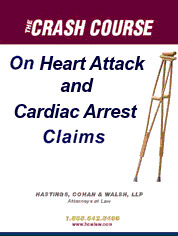AED Attorneys
The automated external defibrillator (AED) is more than a medical device; it can be a true lifesaver if applied according to instructions. As the most effective and commonly recommended non-medical lifesaving measure for heart attack, AEDs are easy to use and therefore perfect for use by non-medical personnel in response to emergency situations of cardiac arrest.
The AED method is so effective for restoring normal heart rhythm that there are both federal and state laws in place to encourage AED use throughout the country. Victims of heart attacks in public places and family members of those heart attack victims should research the AED laws in their state and talk to AED attorneys to learn more about victims’ rights to quick emergency AED treatment.
State Laws and AEDs – Protect Heart Attack Victims
The Cardiac Arrest Survival Act was initiated in 2000 to protect people who go into cardiac arrest in federal buildings. Today, there are also a variety of state laws that have been enacted requiring certain public locations to maintain functional AED devices and employ staff trained in AED delivery. Every state differs in its legal requirements, but AED Attorney Richard Hastings can provide state-specific information to help you decide if you have an AED negligence claim.
Examples of state-mandated public locations that may be required to provide AEDs and trained AED personnel include:
- Day care centers
- Sports arenas
- Dental offices
- Nursing homes
- Swimming pools
- Movie theaters
- Health clubs
- Golf courses
- Shopping malls
- Government buildings
- Public and private schools
- Cruise ships
Liability Protection for “Rescuers”
Although there are Good Samaritan laws that protect non-medical personnel from liability in the event that they attempt an AED rescue unsuccessfully, you may still have a case if a rescuer was certified and failed to follow protocol, if the public site failed to put employees through AED training, or if the business did not have an AED-trained worker on staff at the time of the emergency. Each state defines “rescuer” uniquely, so it is important to talk to a skilled heart attack lawyer about your situation.
To find out if your loved one’s heart attack and slow emergency response was in violation of state or federal AED laws, please contact our AED attorneys today.
